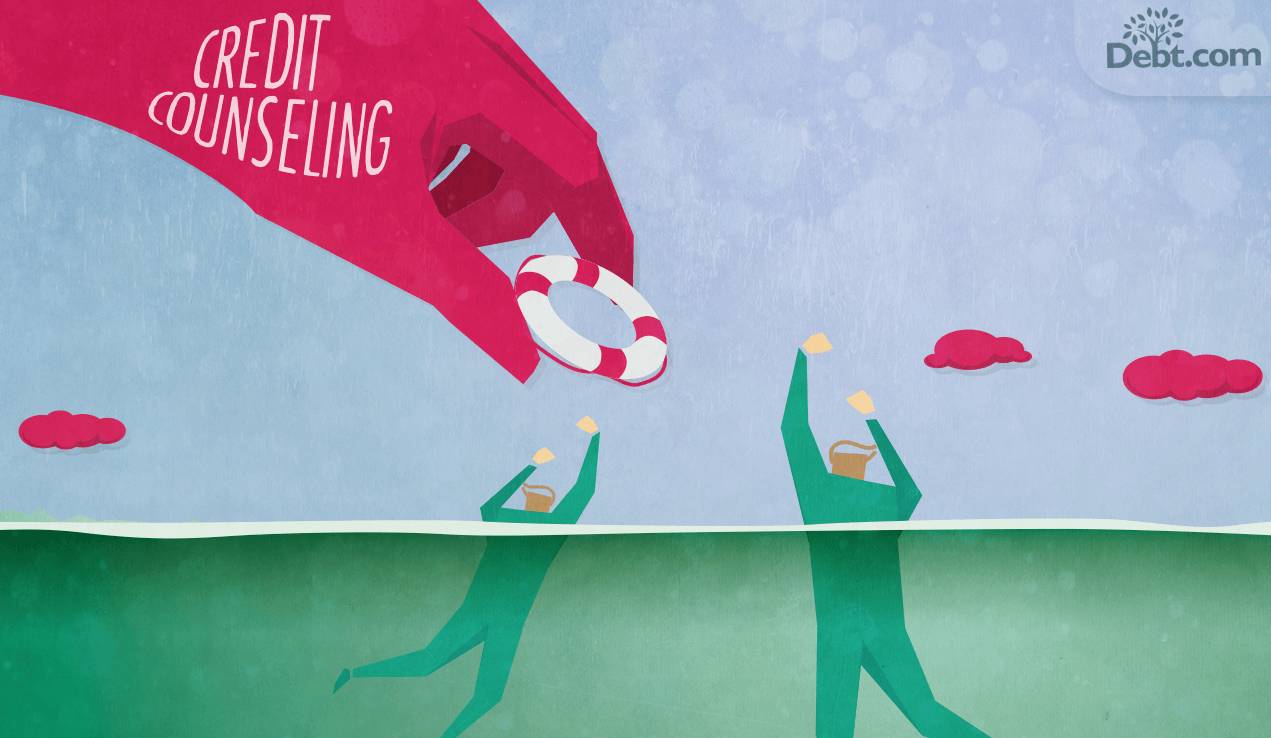Credit counseling could be the best first step to ending your battle with debt.
Consumer credit counseling is a nonprofit service that helps consumers who are overextended with high-interest rate credit card debt. It can be a fast and easy way to find the best solution to become debt-free, minimizing what you pay out of pocket.
Find out everything there is to know about this service – including the step-by-step process of credit counseling, how it can benefit you, and how to avoid credit counseling scams.
What is credit counseling?
Credit counseling is a professional service that assists people in getting out of credit card debt. These services may also be referred to as debt counseling or financial counseling. All of these terms are roughly interchangeable.
The credit counseling process starts with a financial consultation. The counselor reviews your finances and helps you understand your various options for getting out of debt as quickly as possible as well as how to improve your financial literacy overall. The next steps will depend on your particular situation.
Interested in credit counseling but unsure you’ll qualify? Use Instant Debt Advisor℠. It’ll ask you a series of questions to narrow down the right solution for your debts. You’ll find out in three minutes if credit counseling is the best service for you. Instant Debt Advisor℠ is free to use and will have no impact on your credit.
Credit counseling is unique to other debt relief options Instant Debt Advisor℠ may recommend. Keep reading to find out how it works and what you can expect from the experience.
Does credit counseling hurt your credit?
Your credit score is not a factor in qualifying for credit counseling. In addition, when done correctly, the program has either a neutral or positive effect on your credit. In other words, if you still have decent credit when you start the program, completing it won’t set you back.
It’s also worth noting that working with debt counselors won’t negatively impact your ability to qualify for new financing. The initial consultation, even with a credit check, won’t affect your score. Even if you enroll in a debt management plan – a repayment arrangement that can eliminate interest charges and fees – you can still get approved for loans, such as a mortgage or an auto loan. The only limitation is that you cannot open new credit card accounts during enrollment.
It is important to note that while credit counseling does not have a negative impact on your credit score, completing a debt management program (DMP) can.
While the program helps you build a positive credit history, a DMP closes your credit cards. Closing cards can drop your score if your score was high when you began the program. However, people with fair or bad credit generally see their scores improve over the course of the program.
What do credit counselors do?
Credit counselors play a crucial role in assisting individuals who are struggling with their personal finances. Credit counseling services offer a lifeline to those individuals, providing them with the tools and knowledge necessary to navigate their financial challenges effectively. These services provide valuable guidance, education, and support to help individuals manage their debts, improve their credit scores, and ultimately achieve financial stability.
Perform a credit report review: To get an idea where your credit record stands, a credit counselor will pull a copy of your credit report. While the report may seem like a bunch of hard-to-decipher credit history to you, a trained credit counselor knows what to look for and where you need improvement.
The credit counselor can go over your credit report section by section, explaining what all those numbers and notations mean, and offer suggestions on how to improve your credit score.
Create a debt management plan: When you owe a lot of creditors, the monthly bills can pile up fast. A nonprofit credit counselor can set up agreements with you and your creditors, allowing you to make one lump sum payment to the credit counseling agency every month. Then the agency sends the agreed-upon monthly payments to your creditors.
Teach how to manage money better: If no one showed you how to manage money, how interest works or how to create a budget, it’s never too late to learn. Along with helping you create a monthly budget so your money goes further, nonprofit credit counseling agencies also offer planning tools and calculators, homeownership and foreclosure prevention counseling, and bankruptcy counseling.
Explain debt management options: Don’t stumble through the fine print of debt-relief options alone. A credit counselor can help you understand the difference between debt settlement and debt consolidation and explain the pros and cons of each, along with offering other options, including a debt management plan.
Improve money habits: Putting together a monthly budget is a great start, but what about examining your daily spending habits? When you meet with a credit counselor in-person or by phone, he or she can help you determine where you’re frittering away money on mindless purchases and what you can do instead.
Then the two of you can come up with ways to improve your money habits so you can pay off debt and prevent racking up more debt later.
- Answer questions about different strategies for getting out of debt
- Assist you in identifying the right solution for your immediate and long-term financial needs
- Help you eliminate your existing credit card balances and possibly other unsecured debts, like unpaid medical bills and payday loans
- Eliminate the hassle of collection calls (once you enroll, you can pick up the phone and tell them you’re working with an agency)
- Provide resources to build financial literacy
- Teach you how to budget and manage credit effectively
- Help you establish long-term financial stability
What can’t they do?
- Repair your credit (that’s a different service)
- Provide immediate debt forgiveness – Debt management programs (DMP) take about 36 to 60 payments, on average
- Negotiate settlements with your creditors – Some agencies may offer less-than-full-balance programs that only pay back a portion of what you owe, but these are preset agreements that creditors offer for customers facing severe financial hardship
- Provide direct assistance for other types of debt – Mortgage, back taxes, or student loans; however, they can refer you to other service providers
- Stop existing court actions regarding your debt – If a collector already sued you and won, the ruling stands
What to expect in a credit counseling session
A certified credit counselor will evaluate your debts, budget, and credit. You’ll also talk about your financial needs and goals. Then, they’ll help you identify the best method of getting out of debt considering your unique situation. In addition to teaching you how to better manage your money, they can actively help you reduce your debt by enrolling you in a debt management program (DMP).
The first step in credit counseling will always begin with a consultation which can take between 30 minutes to an hour. Have your financial documents, like your most recent credit card statements, available for reference so that you can share all necessary financial information such as balances and interest rates. You will also need to share the last four digits of your Social Security number for a soft credit pull.
How does credit counseling work?
When faced with overdue notices, late fees, and collections notices, things can quickly become overwhelming. A common problem when people face financial challenges is that they don’t know what debt relief solutions are available to them. Most people don’t look into them until they’re already in debt.
Step 1: Contact a credit counselor
Certified credit counselors are trained to be knowledgeable about all available debt solutions. They can assess which debt relief strategy is best for your unique financial situation. A credit counseling session is usually done over the phone. However, the consultation can also take place in person or start online by filling out a form detailing your situation.
Step 2: Assessment of your financial situation
To start the credit counseling process, the counselor will ask for some basic information about your financial situation. Be prepared to share information including:
- Your income
- Current debts, including secured loans like your mortgage or auto loan
- Monthly expenses – i.e. groceries, gas, entertainment, subscriptions… everything in your budget
- Current balances on your credit cards as well as the APR on each account
- Other obligations, such as payday loans and unpaid medical bills
In order for credit counseling to be truly effective, it’s vital to be completely honest with your financial situation. Withholding any information could drastically affect which debt relief option they recommend.
Step 3: Authorize a credit check
To complete the picture of your finances, the counselor will ask to run a credit check which allows them to review your report to see if you have collections or other items of note. This is a “soft” inquiry and does not impact your credit score.
Step 4: The credit counselor will make a recommendation
Once they have a good picture of your finances, the counselor recommends the types of debt relief services that would be best for your circumstance:
Counselors are required to review all your options and only recommend the best solutions for your situation. In other words, nonprofit agencies don’t try to “sell” their program. This is why credit counseling is the best way to find a solution for paying off debt that fits your needs. You can get an unbiased, expert opinion about what you need to do to take control of your finances and ask questions about different solutions and learn how to minimize things like credit damage.
13 questions to ask during your free counseling session »
Talk to a certified consumer credit counselor today for an expert opinion on your best option to get out of debt.
Is credit counseling right for me?
If any of these signs sound like you, you may benefit from meeting with a credit counselor at a nonprofit credit counseling agency.
Are you paying the rent late because most of your paycheck goes toward credit cards, loans or medical bills? If you’re struggling to pay monthly expenses, a meeting with a nonprofit credit counselor could be in order. However, even your creditors may be a source of help.
Contact your credit card issuer and ask to change the card’s due date so payment isn’t due the same week as rent. Try to negotiate a lower interest rate so the balance doesn’t grow as quickly. If medical bills are the problem, contact the hospital or doctor’s billing office about a payment plan with lower payments.
If you’re constantly juggling payments with which utilities to pay and which to let slide for a few weeks or whether to make a credit card payment vs. your monthly car payment, you could benefit from some guidance on budgeting and paying off debt.
A credit counselor can help you create a monthly budget that helps you manage money better and pinpoint areas where you can cut back.
Paying off some debts, especially high-balance student loans, can seem impossible. If you can’t imagine eventually arriving at a zero balance, you probably need help figuring out how to pay a debt.
If you have federal student loans, contact the loan servicer about consolidating multiple loans and/or arranging a payment plan with an end in sight. Or, if your debt stems from a pricey car you can’t afford, you may need help selling the vehicle and replacing it with one that’s more affordable.
If you’re making monthly payments, but your credit card balances drop only slightly, you’re not making large enough payments to knock down the principal after paying interest. Do you have so many credit card or loan payments due each month that your paycheck is spread too thin?
Maybe it’s time to seek financial guidance from a nonprofit credit counselor who can show you how to create a monthly budget and help with a strategy for which debts to pay off first.
It’s not usually a good idea to take out one loan to pay off another loan that paid an even earlier loan. And it’s a terrible idea to hand over the title of your car in exchange for a title loan or get a payday loan so you have enough to make monthly payments to all your creditors.
If you can’t pay the debt you already have without going deeper in debt, it’s time to seek counseling from a nonprofit credit counseling agency that has your best interests – not its own profit margin – in mind.
If you have a history of racking up too much debt over and over – even after you pay off every balance and promise to never relapse again – you may need to ask for help from more than one source.
A nonprofit credit counselor can help you analyze spending habits, create a monthly budget and establish a debt payoff plan. At the same time, it may also be a good idea to consider seeing a therapist who can help you understand your self-destructive financial patterns so you can stop repeating them.
If your parents paid off your $30,000 credit card debt three years ago, and now you owe even more, their generosity may have made paying off debt seem easy. This time, though, they may not be so eager.
If you’re counting on someone to bail you out again, consider how it worked out the first time. If you want to get rid of the new debt – and suffer enough in the process to never rack up that much debt again – there’s only one person who can help this time: You.
If you have thousands of dollars in credit card debt that you’re struggling to pay off — or even make timely payments on at all — you can benefit from credit counseling. A credit counselor can help you work payments into your budget and come up with a debt payment plan with an end in sight.
If you have a poor (less than 580) or fair (580 to 669) FICO score, those three digits are likely holding you back from getting a car or other loan at a good interest rate, getting approved for credit cards and maybe even getting a job if a potential employer runs a pre-hiring credit check.
A credit counselor can pull a copy of your credit report, show you areas where you need to improve and offer advice on how to raise your credit score to good (670 to 799), very good (740 to 799) or exceptional (800+).
People with medical debt are three times more likely to have mental health issues such as depression, anxiety, and stress due to worrying about debt, according to a 2020 study by AIMS Public Health. But it’s not just medical debt that can keep you up at night and make you irritable, anxious, and depressed.
If you’re losing sleep over debt and other financial troubles, meeting with a credit counselor is a good first step to getting back on track and learning good money habits so you don’t end up in the same situation later.
If collection agents are leaving messages, calling you at work or sending urgent letters to pay up, it’s time to seek help. A credit counselor may be able to work out payment plans or a settlement with collectors. The counselor can also help you work payment plan payments into your monthly budget.
Pounding away at debt goes faster when you have more money to throw at the balance. Want to speed up paying off debt? Then cut those unnecessary expenses gobbling up your paycheck by redefining what “necessary” means to you.
For instance, you “need” to pay monthly rent or a mortgage payment. But you don’t “need” cable TV when you can pay that $100 saved each month toward a credit card to pay it off sooner. Take your lunch to work for a while and you can make even bigger payments. The sacrifices you make now will lead to more freedom later, once creditors are off your back.
When you maxed out a few credit cards, you probably weren’t thinking about how much all those monthly payments would total each month. Now that you’re getting billing statements, however, you can barely make minimum payments. Yet making minimum payments each month can keep you in debt for years.
If you’re wondering how much interest you’ll pay and how long it will take to pay off a debt making only the minimum payment, read the “minimum payment warning” on your credit card statement for the bad news. Then pay more than the minimum to pay the debt faster.
Even though you want to pay off debt quickly, you still need money to live on once you make all those monthly payments. It does no good to be overly ambitious with larger payments toward debt if you must resort to charging more on a credit card midway through the month.
Try a plan that focuses heavily on one debt at a time while making smaller payments to other creditors. For example, you could try the “snowball method,” in which you focus on the smallest debt first while making small payments on other debts. When the smallest debt is paid off, move on to the next highest debt, adding the amount you were paying on the paid debt to the next debt’s monthly payment amount.
Enrolling in a debt management program (DMP) through a credit counseling agency is not a magic cure-all. It won’t work in every situation for every type of debt. Even when it comes to unsecured debt, you need a specific set of circumstances for this to work. Those circumstances are pretty broad but they don’t apply to everyone.
- You must have at least $5,000 in unsecured debt. If you owe less than that, use a DIY solution.
- You must have at least some income to make a reduced monthly payment. If you’re unemployed, this solution won’t work until you get a new source of income.
- Most of your accounts need to be with the original credit issuer and not sent to collections. If your accounts are already with collectors, you may be better off with a settlement. Technically, you might be able to include collections in a DMP but collectors are less likely to agree to these types of repayment terms. In addition, collection accounts have no interest charges, so you lose one of the benefits of counseling (interest rate reduction).
- Most of your financial challenges should be caused by credit cards. If most of your debts are unpaid medical bills, you don’t get any benefit from the interest rate reduction. In this case, you should work out repayment plans or settlements with the original service providers.
Credit counseling and debt management
A debt management program can significantly lower your monthly payments and stop the damage to your credit score. The credit counseling agency acts as a go-between for you and your creditors. They set up a repayment plan that you and credit card issuers agree on, and credit counselors also work with creditors to reduce or eliminate interest and fees. You’ll still need to pay off the full principal amount owed.
Your organization should also provide free resources you can use to build financial literacy. The goal is to help you learn how to avoid financial hardship in the future and plan for long-term financial stability. You should receive information on how to budget, save, and plan for financial challenges. Not only beneficial for reducing debt in the short term, but debt management programs also provide tools to successfully manage your finances in the future. There is no minimum credit score requirement to enroll in a DMP.
If you run into trouble during your program, you can talk to the counseling team to make special arrangements. They may be able to help you delay or adjust your payment without jeopardizing your plan entirely. They are there to be a financial coach and provide assistance to ensure you can graduate from your plan successfully.
Credit counseling vs debt consolidation
Credit counseling is a service whereas debt consolidation is a debt-reducing strategy. Debt consolidation combines all loans from one or multiple lenders so that the individual only needs to make one monthly payment to the refinancers with a single interest rate, rather than making multiple payments for loans of different rates. There are several options for debt consolidation: balance transfer, debt consolidation loan, or debt management program. Aside from offering advice, a credit counselor can only enroll you in a debt management program—they do not offer any consolidation services.
Credit counseling vs financial advisor
Credit counselors are certified professionals trained to help individuals manage their debt and improve their financial literacy. They are usually turned to when a person finds themselves in or on the brink of financial difficulty such as being unable to make payments or owing more than they can afford.
Financial advisors are a much broader category of professionals. They don’t require any specific accreditation and can include a wide array of different services and titles including investment advisors, brokers, financial planners, asset managers, or wealth advisors. These professionals focus on financial growth rather than repair. The most similar type of financial advisor to a credit counselor is a financial coach who teaches clients basic financial literacy. However, only a credit counselor can enroll you in a debt management plan and work out better debt repayment terms with your creditors.
How to choose a credit counseling service
Almost all credit counseling services these days are non-profits. However, this status doesn’t mean that any business touting itself as a credit counseling service is legitimate. There are plenty of cases of businesses presenting themselves as credit counseling agencies when they really aren’t. That’s why it’s important to know what to look for when choosing a credit counseling organization.
Is the agency accredited?
Look for an agency that’s accredited by a national trade organization like the National Foundation for Credit Counseling (NFCC) or Financial Counseling Association of America (FCAA). If they’re a member of a national trade association, it means they’re compliant with the highest industry standards including [1]:
- Annual agency audits
- Agencies are licensed, bonded, and insured
- Offering a variety of types of consumer support
- Funds are disbursed on behalf of clients at least twice a month
- Clients can make deposits through a variety of methods
- Every client receives counseling
- Clients receive at least a quarterly statement
Are they approved by the DoJ?
The U.S. Department of Justice (DoJ) has a list of credit counseling agencies that are approved to offer services for pre-bankruptcy counseling. Only DoJ-approved credit counseling agencies can provide the counseling required to file personal bankruptcy in the U.S.
Thus, you can look up an agency and see if they’re approved to provide counseling through U.S. bankruptcy courts. If not, then you may want to use the DoJ tool to do a search for an agency in your area that is approved.
No upfront charges
A credit counseling agency that exists to help people (rather than just make money off them) shouldn’t charge any upfront fees without service. Any agency that requires money before giving you more information, providing counseling, or guaranteeing certain results, is a red flag. Also, skip any agencies that charge for educational materials or workshops. Their goal should be to set you up for long-term financial success to avoid debt in the future.
Doesn’t push a one-size-fits-all solution
A credit counseling organization that’s legit and truly has your best interests at heart shouldn’t immediately push you into a debt management plan (which is a service they charge for). Legally, credit counselors are required to tell you about all debt relief options and only recommend what best suits your situation. So if you speak to an agency that instantly tries to push you towards a DMP or doesn’t tell you about any other options, look elsewhere for financial assistance.
Are counselors qualified?
In addition to checking for the validity of the credit counseling agency, look into the qualifications of those you’d be speaking to. How are counselors trained? Are they accredited or certified by a non-affiliated organization like the National Association of Certified Credit Counselors? If not, you just might be speaking to salespeople who make commission after getting you to agree to a certain service.
Look for consumer complaints
Once you’ve found an agency that seemingly checks all the boxes, check with consumer protection sites like the Better Business Bureau (BBB), a local consumer protection agency, or with your state’s Attorney General. Here you can read reviews from past clients to find out whether the company delivers what they say they will and check for any official complaints against them.
How to spot a credit counseling scam
- Charges upfront fees before they perform any actual service. This is the biggest red flag that a credit counseling or debt relief agency you’re working with isn’t legitimate. According to federal regulations, companies cannot charge fees until they provide some form of actual relief.
- Guarantee to improve your credit score by a certain number. Although data shows completing a debt management program can improve credit scores in many cases, it’s impossible to guarantee. Results vary based on where you started when you enrolled and what negative penalties you incurred prior to enrollment. Be wary of other false promises that can remove negative marks from your credit report.
- Advise you to do something illegal. A certified credit counselor will never tell you to try and create a new identity to get away from your old debt. Companies that advise people to get a new Social Security number or Employer Identification Number (EIN) are scams! Counselors won’t even advise that you run or hide from creditors or collectors; they help you find ways to face your challenges directly.
- Immediately push you into signing up for a specific solution. Nonprofit agencies must advise a client of all available paths to take to become debt-free and only recommend the best solution. If an agency pushes you to enroll in their DMP–or doesn’t even mention the other options available– they’re not following nonprofit counseling organization rules and likely aren’t reputable credit counseling agencies.










